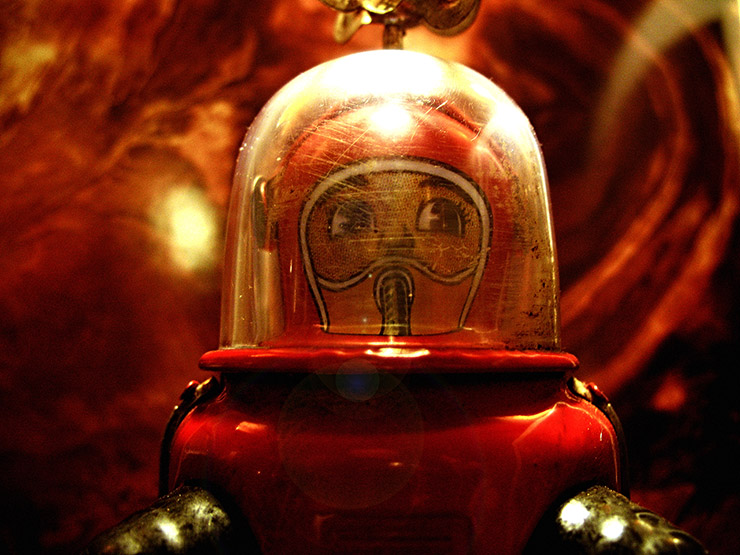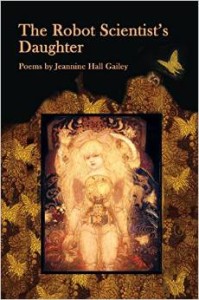Growing up in mosquito-laden New Orleans, one of the periodic excitements in the neighborhood was the arrival of the fogging trucks. They would travel slowly down the street, spraying a fog of DDT. The truck’s appearance on the street was the excuse for an impromptu parade – 20 or 20 of us would run for our bikes and follow the fog in the truck’s wake.
It was the late 1950s, before Rachel Carson and the environmental movement, before thalidomide, a time when America believed in itself and in technology. Only later would we come to understand that technology is a two-edged sword. It can bring great good; it can also bring unintended and unexpected consequences. The fire of Prometheus brought warmth and light; it also brought destruction. Technology is never neutral.
Jeannine Hall Gailey grew up in one of the great centers of technology in America – Oak Ridge, Tennessee. Like its sister site at Los Alamos, New Mexico, Oak Ridge was a focus of America’s atomic energy program. Gailey’s father was a professor at the University of Tennessee, and a consultant at Oak Ridge. Specifically, he consulted on robotic-based ways to clean up nuclear waste (this was not the 1950s; by the time Gailey lived in Oak Ridge, the problem of nuclear waste had long been recognized).
Gailey did not grow up in a nuclear wasteland, despite the Geiger counter in the basement of her home; despite considerable poverty, Appalachian Tennessee was a place of considerable natural beauty. What she does in The Robot Scientist’s Daughter, her fourth collection of poetry, is to combine that natural beauty surrounded her childhood with the unnatural, destructive and often deadly effects of nuclear technology and research. That technology had its own kind of beauty, which she summarizes in the opening poem of the collection.
Copper burns green, Sodium yellow,
strontium red. Watch the flaming lights
that blaze across your skies, America—
there are burning satellites
even now being swallowed by your horizon,
the detritus of space programs long defunct,
the hollowed masterpieces of dead scientists.
Someone is lying on a grassy hill,
counting shooting stars,
wondering what happens
when they hit the ground.
In my back yard in Oak Ridge,
they lit cesium
to measure the glow.
Hold it in your hand:
foxfire, wormwood, glow worm.
Cesium lights the rain,
is absorbed in the skin,
unstable, unstable,
dancing away, ticking away,
in bones, fingernails, brain.
Sick burns through, burns blue.
Many of the poems in the collection are entitled “The Robot Scientist’s Daughter, ” with a parenthetical word of phrase to differentiate them, such as “villainess, ” “medical wonder, ” “triangulate, ” “experiments in sleep deprivation, ” and “brushes with death.” Some 20 of the poems are so entitled. But even those poems with different titles are also Gailey’s story of growing up near Oak Ridge, sharing that point-counterpoint of natural beauty and technology fallout. All of the poems are written in a narrative, almost journalistic fashion, bring with them a sense of news and urgency.
Gailey’s previous books of poetry are Becoming the Villainess, She Returns to the Floating World, and Unexplained Fevers. She’s received a number of awards and prizes, and her poems have been published in American Poetry Review, The Iowa Review, Prairie Schooner, and other publications.
The Robot Scientist’s Daughter is a remarkable, cohesive collection, built upon the same theme. It is a story of a unique childhood, and an American childhood. It is also the story of nature and technology, and the bargain we make between the two, often without fully understanding what we’re doing.
It is indeed the fire of Prometheus.
Related: Jeannine Hall Gailey reads “Cesium Burns Blue:
Art by Dino Olivieri, Creative Commons, via Flickr. Post by Glynn Young, author of the novels Dancing Priest and A Light Shining, and Poetry at Work.
Want to brighten your morning coffee?
Subscribe to Every Day Poems and find some beauty in your inbox.
- Epigrams and Epitaphs: Martin Armstrong and “Fifty-Four Conceits” - January 16, 2025
- Poets and Poems: Michael Favala Goldman and “Destinations” - January 14, 2025
- 7 Tips for the Novice Historical Novel Writer — Learned the Hard Way - January 9, 2025




Richard Maxson says
Glynn, wonderful review of a very unusual and beautiful book of poetry. I especially enjoyed The Robot Scientist’s Daughter [medical wonder].
Also, I would like to congratulate you for, like me, still being here on earth after many, many followings of the DDT truck on my bike wt a very young age. I can only imagine our trust generated some kind of mercy that has seen us through. Was that a good time or what?!
Melanie says
I’m reading this book now, and I’ll be posting a review as part of Gailey’s blog tour. Thank you for posting the video of “Cesium Burns Blue” – I always wonder if I’ve been reading poetry in the right voice, and the video tells me that I have… matter-of-fact, without additional drama because the words are so clear.